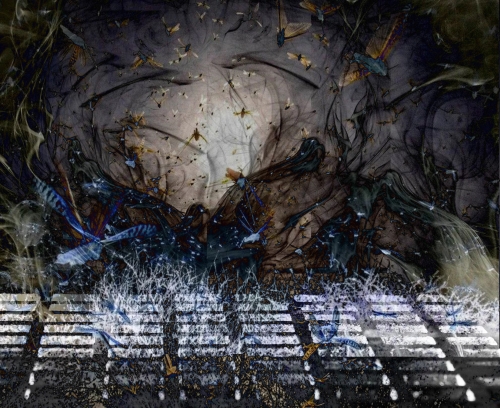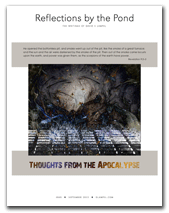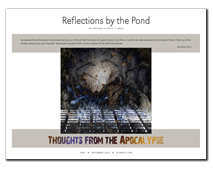He opened the bottomless pit, and smoke went up out of the pit, like the smoke of a great furnace; and the sun and the air were darkened by the smoke of the pit. Then out of the smoke came locusts upon the earth, and power was given them, as the scorpions of the earth have power.
Revelation 9:2–3
And I, with faltering footsteps, journey on,
William Cullen Bryant
Watching the stars that roll the hours away,
Till the faint light that guides me now is gone,
And, like another life, the glorious day
Shall open o’er me from the empyreal height,
With warmth, and certainty, and boundless light.
Masks Off
The first woe is past; behold, two woes are still coming after these things.
Revelation 9:12
Somewhere around the middle of the Tribulation period in The Revelation there will be three “woes.” After the first woe—a set of judgments—two more woes will be waiting in the wings. These will be the sixth trumpet and the seventh, the last encompassing all the “bowls of wrath.”
These are “woes” indeed, not just with their suffering, torment, and death, but in the disruption of the very nature of the tripartite intersection of God and Man and Satan. Believers at the time of the Rapture will not be experiencing this firsthand, but just imagine for a moment that you are someone left on earth after that dramatic moment. Set aside your spiritual condition; you are just someone who lived through things the way they used to be, and are now living through the changes taking place during the subsequent seven years of the Tribulation.
Before—before the Tribulation, before the Rapture—there was God in His heaven and Satan somewhere below, with Man in the middle. As someone dwelling on earth, you perceive—in an admittedly simplistic sense—God as goodness and love, and you perceive Satan as evil and hate. But for the most part this is all academic for you; both of these forces—good and evil—are extraneous to your daily life, more philosophical than pragmatic, more thought-experiment than having any practical application to your existence. If pressed, you can imagine these two as actual, living beings, but they are so far distant, so amorphous to your senses that neither occupy much space or time in your life.
As the period of the Tribulation (which, of course, you do not know by that name) begins and proceeds, things on earth begin to get uncomfortable; life becomes increasingly a struggle, with wars, food shortages, peculiar atmospheric effects and cataclysmic upheavals on the earth. An individual in the military-political sphere is making himself known, gathering supporters. Soon he has taken center stage—not just in one nation, but in all. He seems to have all the right answers for all the wrongs in the world. Then, after another series of strange insults to the natural world, you begin to realize that God in heaven may be something more complicated than just “goodness and love.”
It is apparent that most of the “bad” things happening on earth are being instigated from above—from God, or at least from His domain in the heavens. The media are flooding the airwaves and the internet with blistering reports all about “The Wrath of God Has Come,” “Ancient Prophecies Fulfilled,” and “Get Out While You Can!” It would seem that your comfortable “God of love” has become a God of hate.
Then one terrible day you awake to skies filled with bizarre creatures released from the bowels of hell itself—horses that fly, or are they locusts with the faces of men? or scorpions with long, flowing hair? They cannot be defined, but fill the air like living pollution, darting here and there, anywhere they please, their long tails flashing like convulsive snakes, stinging painfully every person they touch. In fact, cities and countryside alike are littered with people writhing on the ground in agony, wishing only to die—Please, kill me, anyone, please I can’t stand it!
But no one is permitted to die, and no one is permitted to kill.
No one needs to be told: these monsters are demons, led by demons, created by the one demon worst of all, Satan.
His mask has been removed, and we now see him and his angels for what they truly are.
Destroyers.
Such is the character of Satan and those who affiliate with him as wicked or fallen angels. Though in the modern world Satan often appears as an angel of light in the role of that which is good and religious, here the mask is stripped away and evil is seen in its true character. Satan and the demons are seen as the destroyers of the souls of men and as those who can only bring affliction. When divine restraint is released, as in this instance, the true character of the evil one is manifested immediately.
Desperate indeed will be the situation of those who know not Christ in these tragic hours preceding His return to judge the wicked world. The tribulation period unmasks human wickedness and also demonstrates the true character of Satan. In our modern day while Satan is still restricted it is easy to forget the great conflict which is raging between the forces of God and the forces of Satan (Ephesians 6:12).
In the great tribulation, and especially in the time of the fifth trumpet, with the release of the confined demons the full character of Satan will be starkly manifested. For the first time in history all those who do not know the Lord Jesus Christ as Saviour will come under demonic possession and affliction. What is true in that hour is also true in some measure today, for there is no deliverance from the power of Satan nor from his affliction apart from salvation in Christ and the delivering power of God.
Dr. John Walvoord
Tenacious Sin
His sin nature is the most tenacious characteristic of man. It has been part of every human being’s DNA since Eden. It is not just tenacious, but incredibly strong, for it is nurtured, it is sustained, it is fed and encouraged every day by the very enemy of God.
This sin nature in man is so strong, so pervasive, that it even overwhelms another strong characteristic of man: self-preservation. Most sane people will do just about anything to live, to survive—or their conscience will demand at least a high and righteous reason to sacrifice their own life, such as giving their life in exchange for the life of a loved one.
By the time of the Great Tribulation during the last things, at least three to four years into the period immediately after the church is removed from the earth, every person still walking this tortured earth will have had ample opportunity to know—or at least to hear—that salvation and peaceful, joyous eternal life with God is available in Christ Jesus. They also will have had ample opportunity to sample the alternative, for life on earth by this point will have been reduced to a quite literal hell on earth. They will know from experience what an eternity in perdition will be like.
Then He left the crowds and went into the house. And His disciples came to Him and said, “Explain to us the parable of the tares of the field.” And He said, “The one who sows the good seed is the Son of Man, and the field is the world; and as for the good seed, these are the sons of the kingdom; and the tares are the sons of the evil one; and the enemy who sowed them is the devil, and the harvest is the end of the age; and the reapers are angels. So just as the tares are gathered up and burned with fire, so shall it be at the end of the age. The Son of Man will send forth His angels, and they will gather out of His kingdom all stumbling blocks, and those who commit lawlessness, and will throw them into the furnace of fire; in that place there will be weeping and gnashing of teeth. Then the righteous will shine forth as the sun in the kingdom of their Father. He who has ears, let him hear.”
Matthew 13:36–43
We may marvel at the stubbornness of man; we may stand agog at the utter stupidity of choosing darkness over light, of eternal death over life eternal with the only true God, but the evidence is clear—not just in the final chapters of Scripture, but as we can see and experience even in the world around us today—that there will always be those who, to the very end, reject the grace and forgiveness proffered by God in Christ.
By the sixth trumpet the Lord God will have given everyone on earth a sample of hell, yet those not killed by this demonstration will tenaciously cling to their sin, unrepentant to the end.
Through the seven seals and the subsequent six trumpet judgments God, in a crescendo of violence, has heaped burning coals onto the inhabitants of this globe. Will He be justified? Does He have the right to do such things? Yes, He is sovereign God, but is this fair? Is this justice from a loving God?
For at least four to five thousand earth years, perhaps longer, God has demonstrated His longsuffering, His patience, His forgiving response to repentance. Along with that, however, He has repeatedly warned about the price to be paid by man’s unrepentant rebellion against Him. On top of that, knowing the nature of man since Eden, His unbounded love caused Him to offer Himself, in the person of the Son, as a final blood sacrifice for the sins of man. Man was incapable of saving himself, so God did it for him.
So is He justified in pouring out the judgments of the seals and the trumpets, and finally, the seven bowls of wrath?
Of course. For thousands of years God has warned that this was coming. Now, in the narrative of the Revelation, it will have arrived.
The awful Day of the Lord.
Now I desire to remind you, though you know all things once for all, that the Lord, after saving a people out of the land of Egypt, subsequently destroyed those who did not believe. And angels who did not keep their own domain, but abandoned their proper abode, He has kept in eternal bonds under darkness for the judgment of the great day, just as Sodom and Gomorrah and the cities around them, since they in the same way as these indulged in gross immorality and went after strange flesh, are exhibited as an example in undergoing the punishment of eternal fire. Yet in the same way these men, also by dreaming, defile the flesh, and reject authority, and revile angelic majesties. But Michael the archangel, when he disputed with the devil and argued about the body of Moses, did not dare pronounce against him a railing judgment, but said, “The Lord rebuke you!” But these men revile the things which they do not understand; and the things which they know by instinct, like unreasoning animals, by these things they are destroyed. Woe to them! For they have gone the way of Cain, and for pay they have rushed headlong into the error of Balaam, and perished in the rebellion of Korah. These are the men who are hidden reefs in your love feasts when they feast with you without fear, caring for themselves; clouds without water, carried along by winds; autumn trees without fruit, doubly dead, uprooted; wild waves of the sea, casting up their own shame like foam; wandering stars, for whom the black darkness has been reserved forever. It was also about these men that Enoch, in the seventh generation from Adam, prophesied, saying, “Behold, the Lord came with many thousands of His holy ones, to execute judgment upon all, and to convict all the ungodly of all their ungodly deeds which they have done in an ungodly way, and of all the harsh things which ungodly sinners have spoken against Him.”
Jude 5–15
No Longer in Kansas
There is an episode during the Last Things that telegraphs how very much people in those days might be thinking, “Toto, I have a feeling we’re not in Kansas anymore.”
Every one of us, every person living today, has been born, has come of age, and has lived during an age of grace, rightly referred to in evangelical circles as “the church age.” In this age all believers are told to follow the pattern set by Christ Jesus when He was on the earth. We are told to follow the precepts set forth in the gospels and the epistles found in the New Testament. There Christ says in His sermon on the mount to “love your enemies and pray for those who persecute you,” and that we are to “not resist an evil person.” We are to “forgive others” their sins every time they repent—as many times as they do repent. We are not to strike back, but to let the “evil person” strike us again. All this is to illustrate for those in a fallen world the love and grace, the forgiveness and longsuffering of Christ Jesus and His Father. This “dispensation of grace” will come to an abrupt and immediate end at the Rapture, when Christ Jesus returns in the clouds to take every believer, both dead and living, back home to be with Him.
Then, for the next seven years, this world will be a very different place indeed.
Around the mid-point of those seven years two mysterious, dramatic characters will be introduced. A voice from heaven will declare,
“And I will grant authority to my two witnesses, and they will prophesy for twelve hundred and sixty days, clothed in sackcloth.”
Revelation 11:3
God the Father never changes. The Son of God, Jesus the Christ, never changes. Yet with that, the Godhead has and will have a different way of dealing with earth’s people during mankind’s different seasons. Through the entirety of man’s existence since Eden God has demonstrated longsuffering and forgiveness, all the while warning that there will come a day when that will end. To put it in coarse human terms, there will come a day when God “will reach the end of His rope.”
After the Rapture it will be the same God in heaven—but now those left on earth will experience a very different aspect of His nature.
He will keep His promise.
There will be wrath. There will be judgment.
Worship the Lord in holy attire;
Psalm 96:9–13
Tremble before Him, all the earth.
Say among the nations, “The Lord reigns;
Indeed, the world is firmly established, it will not be moved;
He will judge the peoples with equity.”
Let the heavens be glad, and let the earth rejoice;
Let the sea roar, and all it contains;
Let the field exult, and all that is in it.
Then all the trees of the forest will sing for joy
Before the Lord, for He is coming,
For He is coming to judge the earth.
He will judge the world in righteousness
And the peoples in His faithfulness.
His two “witnesses” during the Tribulation will not behave like any during the church age. They will not be from the school of “turn the other cheek.” Quite to the contrary, if anyone just thinks about doing them harm, they will be immediately roasted to well-done.
And if anyone wants to harm them, fire flows out of their mouth and devours their enemies; so if anyone wants to harm them, he must be killed in this way.
Revelation 11:5
God has held open the door for thousands of years, and especially during this age of grace He has offered redemption and salvation all the while delaying His righteous retribution against sin and rebellion.
Thus far.
As He has always promised, there will come a day—it is called “The Day of the Lord”—when His methods will change, and His righteous wrath will no longer be denied.
That day may arrive within the hour.
“I have come as Light into the world, so that everyone who believes in Me will not remain in darkness. If anyone hears My sayings and does not keep them, I do not judge him; for I did not come to judge the world, but to save the world. He who rejects Me and does not receive My sayings, has one who judges him; the word I spoke is what will judge him at the last day.”
John 12:46–48
Issue #869, September 2022.
Reflections by the Pond is published monthly at dlampel.com and is © 2022 David S. Lampel. Unless otherwise indicated, all Scripture is from the New American Standard Bible (Updated Edition). This and all of our resources are offered free-of-charge to the glory and praise of Christ our Lord.



